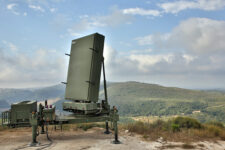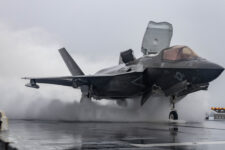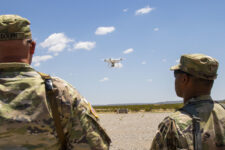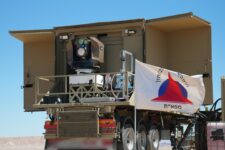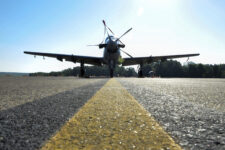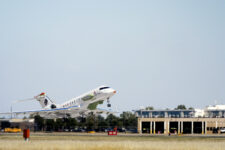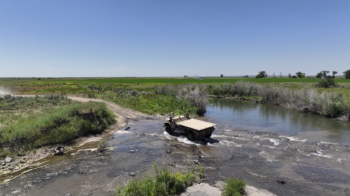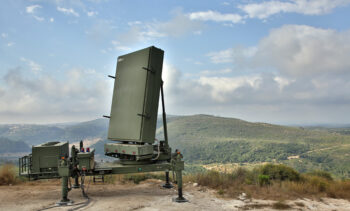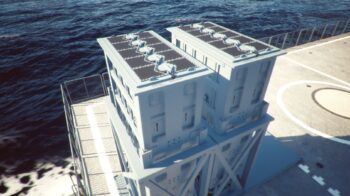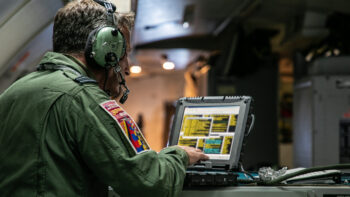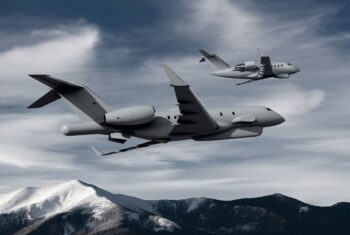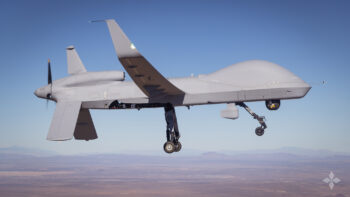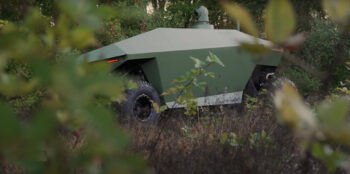
An Israeli CH-53 deploys commandos during an earlier training exercise in 2011.
TEL AVIV: As the Middle Eastern kettle boils hotter, Israel is striving to improve the readiness and efficiency of its forces with regional exercises aimed, in part, at building de facto regional alliances.
Syrian news agencies are reporting another air attack on the Russian-aligned country on June 12. According to Syrian news agencies, the targets were on Tal al-Hara, a strategic hill overlooking the Golan Heights. Sources said that the attack was against Iranian installations used for upgrading weapons systems and preparing drones to be used against Israel. The Syrian News Agency (SANA) claimed to have shot down “several” Israeli planes, a claim they often make but which has rarely proven true. The agency also said that Israel waged “electronic war” — that is, disrupting and deceiving Syria radars and radio — which seems much more likely and is a strong indicator that the Syrians were not able to hit any Israeli aircraft. Israel has not claimed responsibility for the attack.
Later today, Israeli defense unites detected a drone that entered Israeli airspace from Lebanon. After crossing the border it turned around and went home.
Israeli intelligence assessments recently warned that Iran and the Lebanon-based militant group Hezbollah may initiate incidents that would lead to an escalation in the Golan Heights, as part of Tehran’s efforts to combat U.S. sanctions and Israeli strikes against Iranian forces in Syria.

The divided island of Cyprus,
So, the pot boils hotter and Israel searches for ways to keep its forces sharp and able to work with regional partners. A key to that appears to be efforts to bolster its ties to Greece and Cyprus, forming a non-official aerial alliance that may be used if war erupts.
“Look at the location of Cyprus in this Mediterranean area and you will understand the importance of such cooperation between air forces,” a senior Israeli source told Breaking Defense.
Amos Yadlin, a former head of IDF Military Intelligence, told Breaking Defense that the joint drill in Cyprus is mainly to enable the Israeli Air Force to train in a different topography than that of Israel.
But Yadlin, now president of the Israeli Institute for Strategic Studies (INSS) here, said that Israel is also reacting to Turkey’s imminent procurement of the Russian S-400 surface-to-air missile systems, which he said is creating a new aerial reality in the region. During the Cypriot exercise, IAF’s CH-53’s , Apache and Apache longbow helicopters trained in Cyprus with Israeli drones.
Aggressor crews from the 115th (“Flying Dragon”) Squadron simulated ground threats for the aircrews, and a complete array of technicians, maintenance crews and administration personnel supported the deployment, which was located in Paphos AFB in western Cyprus.
Combat helicopters trained in both low and high altitude attack missions. According to the IAF website, one important focus of the exercise was to train the CH-53 helicopter crews in fly at high altitudes: “Flying over the tall mountains of Cyprus challenges the helicopter crews. The air is thin and the helicopter reacts differently, and landing requires a large amount of force that nears the engines’ limits. This is why it is especially important for us to drill just that.”
Although the IAF has already held a number of exercises in Cyprus, this was the first time that Israeli attack helicopter pilots performed combined sorties with Cypriot pilots in their Russian-made Mi-35M helicopters.
The forming of a de facto air alliance in the region began some years ago but has accelerated because of the situation in Syria.
In April, the IAF, Greek and the United Arab Emirates air forces flew fighters together in an exercise in Greece.
There are other immediate security concerns driving the Israelis.

S-400 Triumf missile launcher (NATO designation SA-21 Growler)
Israeli sources told Breaking Defense that Turkey’s acquisition of Russian S-400 surface-air missiles will create a “new order” in the airspaces of the region. The Turkish leadership claims that the S-400 is a closed deal and rejects any pressure applied by the U.S to cancel it.
According to the Institute for National Security Studies (INSS) here, the implementation of the S-400 deal – assuming that the American administration keeps to its current position – is likely to lead to a rift in relations between the Turkey, the US and other NATO allies. In spite of fears that a reaction will push Turkey even further toward Russia, it is likely that the administration and Congress will respond strongly to the move.
An Israel defense expert says that Turkey’s move is a “180 degrees” shift. The question is, where will the Turks deploy the Russian system. “If it is deployed near the border with Syria it may endanger air forces that will attack Iranian-controlled militias in Iraq.”
Iraq hosts more than 5,000 U.S. troops, and they are potential targets for the Iranian-backed militias.
The expert added that the Israeli air force and every other air force that may be involved in the future in operations against Iran or its proxies will now have to train to cope with the Turkish S-400s.
The IAF has already changed its operational patterns while flying over Syria in preparation. Israeli experts who talked with Breaking Defense on condition of anonymity said that the situation will become critical, especially if and when Russian forces leave Syria.
“The S-400 operated by Turkey will be capable of following any activity of the IAF over Syria, and that is a totally new situation,” one of the experts said.
The experts added that should the Russians transfer full control of S-300s sold to Syria to the Syrian army, it will make the situation even worse.
The situation according to the Israeli experts is even stranger, as a U.S TPY/2 X band radar is deployed in Turkey to support NATO ballistic missiles defense. In another move that an Israeli sources says shows that Turkey “spits in the face of Washington,” Ankara has spread the word that it is ready to deploy the S-400 in neighboring Azerbaijan.
The sources pointed to the increasingly complicated regional situation by giving another example. Israel and Azerbaijan have close defense ties that have resulted in huge contracts won by Israeli defense companies. And Azerbaijan has a common border with Iran.
So, if Azerbaijan agrees to “host” the Turkish S-400, the sources say, that creates another “complication” and new potential friction area between Israel and Iran. The kettle bubbles.
